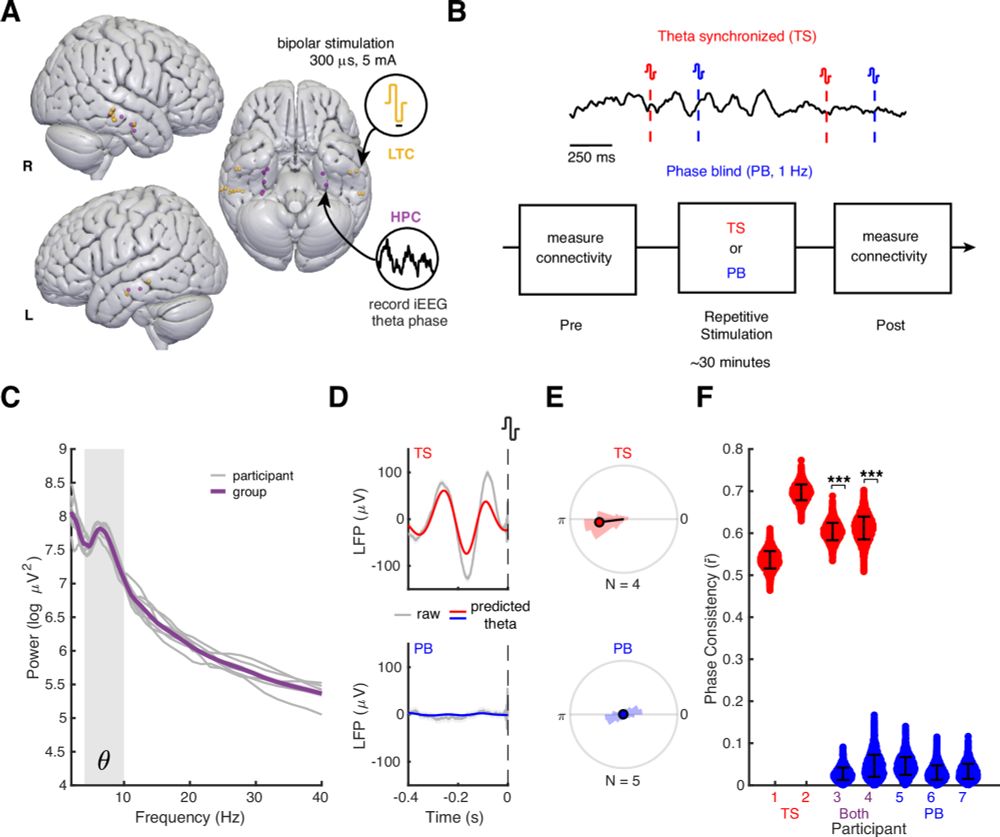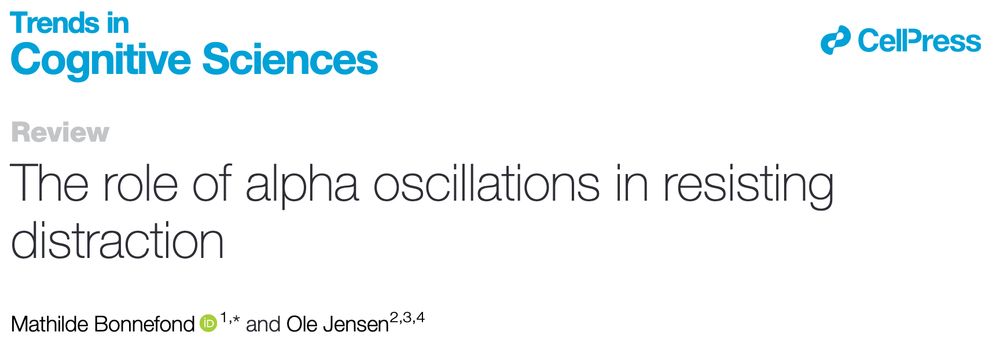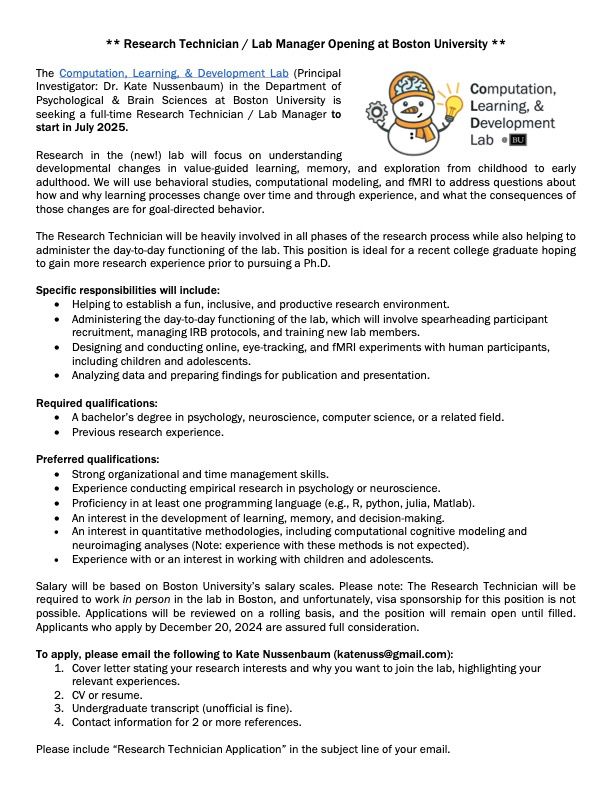
Memory might depend on when you look, not just what you see
Happy to share a new preprint from my postdoctoral work with Jed Meltzer, @drjenryan.bsky.social, and @rosannaolsen.bsky.social
Paper: doi.org/10.1101/2025...
@grahamflick.bsky.social
NSERC Postdoc @ the Rotman Research Institute, Toronto Studying language, memory, and neural oscillations https://sites.google.com/view/grahamflick

Memory might depend on when you look, not just what you see
Happy to share a new preprint from my postdoctoral work with Jed Meltzer, @drjenryan.bsky.social, and @rosannaolsen.bsky.social
Paper: doi.org/10.1101/2025...
Using combined MEG and eye-tracking, we report new evidence suggesting that when eye movements are phase-locked to alpha oscillations in neural activity, the brain can better process and represent the visual objects that the eyes land on, supporting their encoding in memory.
14.10.2025 16:41 — 👍 5 🔁 0 💬 0 📌 0
Memory might depend on when you look, not just what you see
Happy to share a new preprint from my postdoctoral work with Jed Meltzer, @drjenryan.bsky.social, and @rosannaolsen.bsky.social
Paper: doi.org/10.1101/2025...
/1 We took our sweet time (~3yrs) to put this into its final shape - but happy to say that the pre-print of an extensive review of brain rhythms in cognition - from a cognruro perspective - is now available. Please let us know what you think. #neuroskyence doi.org/10.48550/arX...
22.07.2025 12:31 — 👍 26 🔁 15 💬 1 📌 6Proud to share the first preprint of my PhD w/ @barense.bsky.social & Mursal Jahed:
“Putting the testing effect to the test in the wild: Retrieval enhances real-world memories and promotes their semantic integration while preserving episodic integrity”
See thread! 🧵 osf.io/preprints/ps...

Major team effort on phase-locked stim of human hippocampal theta rhythms finally out in the wild! W/ @jkragel.bsky.social @alikwidge.bsky.social and a cast of many. Thanks to the BRAIN Initiative for making it possible.
rdcu.be/ej7VE
During natural reading with eye movements, the left posterior fusiform cortex reflects both fixated and upcoming words in parallel—and distinguishes whether an upcoming word is skipped or fixated. A new preprint from Graham Flick @grahamflick.bsky.social!
28.04.2025 17:55 — 👍 15 🔁 2 💬 0 📌 0
These results suggest that during visual reading, word recognition and integration begin parafoveally, underpinned by the left occipito-temporal system.
AND this system appears to be the first port of call where word processing may rapidly exert downstream influences on eye movement behaviours.
What about word skipping? Here, we examined parafoveal processing of words that were skipped vs. fixated.
This revealed widespread parafoveal effects of frequency and surprisal before skipping, with significantly larger effects preceding skipped words in the left fusiform and middle temporal gyri

We identified putative generators of these influences in left occipito-temporal and ventral temporal areas.
These effects began in posterior areas during parafoveal word processing and shifted anteriorly when the word was fixated.

Matching past work, 2 properties significantly influenced fixation durations: a given word's frequency and it's surprisal in the current context.
Next, we asked where and when these properties influenced neural activity, time-locked to fixation onsets
To try to answer this, we recorded brain activity and eye movements with simultaneous MEG and eye-tracking, while participants naturally read short stories.
This allowed us to analyze neural activity time-locked to more than 22k gaze fixations
As a visual reader moves their eyes across this sentence, they will linger on certain words longer than others, and skip some entirely.
How does the brain make these decisions, based on the incoming linguistic input, in tens or hundreds of milliseconds?

Very happy to share a preprint from the final project of my PhD with @liinapy.bsky.social!
Reading ahead: localized neural signatures of parafoveal word processing and skipping decisions
www.biorxiv.org/content/10.1...

Attention PhD grads looking for research and teaching jobs! Barnard College in NYC is hiring "Faculty Fellows." It's a 2-year mentored position that requires 2 courses/year (or equivalent) and research in one of our labs. Due April 20th. More info: barnard.wd1.myworkdayjobs.com/Faculty/job/...
08.04.2025 19:37 — 👍 3 🔁 4 💬 1 📌 0I'm at CNS presenting new work from my postdoc! Come check out our poster C32 from 5:00-7:00 tonight:
Consistent alignment of saccades and alpha oscillations supports the neural representation and memory encoding of visual objects
w. @rosannaolsen.bsky.social, Jen Ryan, & Jed Meltzer
I'm excited to share our new paper (with @alexanderhuth.bsky.social) on transferring language decoders across participants and modalities!
authors.elsevier.com/a/1kZRD3QW8S...
1/5

Sample images sorted by evoked valence/arousal and memorability. Scene images were selected to span a wide range of average valence and arousal scores. The figure above shows examples of memorable and forgettable images from across the spectra of valence and arousal. Examples include a tornado (negative and memorable), pollution from a factory (negative and forgettable), a field of sunflowers (positive and memorable), a frosty field in early morning (positive and forgettable), a car crash (high arousal and memorable), and a mountain scene (high arousal and forgettable).
How is the memorability of an image influenced by how it makes us feel?
@hartwakeland.bsky.social created an image set (VAMOS) of over 900 scene images, along with their valence, arousal, and memorability ratings. They then showed that *moderately* negative images are more memorable!
(1/2)
Nice study showing that memories for new speech + hand movement associations are linked to the specific words they were learned with, suggesting that "...word or gesture production might reactivate an entire co-speech gesture memory engram"
07.01.2025 17:00 — 👍 1 🔁 0 💬 0 📌 0Please, spread!
🧠 Competitive PhD funding is available for neuroscience projects in the Parisian region. Consider your options 👇
dim-cbrains.fr/en/phd-progr...
@c-brains.bsky.social

Our review out in TiCS spearheaded by Mathilde Bonnefond on the latest ideas on the functional role of alpha oscillations and distractor inhibition - e.g. we highlight that alpha increases might reflect perceptual target load rather than distractor anticipation authors.elsevier.com/a/1kFXN_V1r-...
12.12.2024 10:12 — 👍 60 🔁 26 💬 1 📌 0
@mrccbu.bsky.social are happy to announce Cognitive Neuroimaging Skills Training In Cambridge (#COGNESTIC) on 15-26 Sep 2025. We will provide training in state-of-the-art methods for open neuroimaging analysis and related methods. Look here for more information: www.mrc-cbu.cam.ac.uk/events/cogne...
03.12.2024 11:20 — 👍 9 🔁 5 💬 0 📌 0
Detailed job description, which can also be found here: https://cldlab.org/join/
I'm hiring a full-time lab manager / research tech for my new psychology lab at Boston University, to start this summer (July 2025)!
The lab's research focuses on understanding developmental changes in learning, memory, and exploration.
More details here: cldlab.org/join/
🧠💻 #psychscisky
Opportunity to join a really great group!
27.11.2024 13:59 — 👍 1 🔁 0 💬 1 📌 0
JOB ALERT: We are recruiting a research assistant in the Imagine Reality Lab to work on a project using MEG decoding to distinguish between different theories of consciousness 🧠 Get in touch if you have any questions about the role's scientific details. Please share!
www.ucl.ac.uk/work-at-ucl/...
🙋♂️
15.11.2024 20:10 — 👍 1 🔁 0 💬 0 📌 0Had a lot of fun teaching this workshop on simultaneous MEG and eye-tracking yesterday!
15.11.2024 16:40 — 👍 5 🔁 0 💬 0 📌 0Not so "new" anymore but still here at the Rotman and the University of Toronto Data Sciences Institute, interested in all things memory, language, aging, and MEG/eye-tracking! 👋
14.11.2024 23:29 — 👍 4 🔁 0 💬 1 📌 0Looking to follow more graduate students in psychology? Look no further. Comment to be added! go.bsky.app/SJfTsPJ
14.11.2024 14:10 — 👍 66 🔁 36 💬 49 📌 0
New preprint alert! Project led by the amazing @akulsatish.bsky.social!
Theta and alpha oscillations in human hippocampus and medial parietal cortex support the formation of location-based representations
www.biorxiv.org/content/10.1...
#neuroskyence #PsychSciSky #Cognition